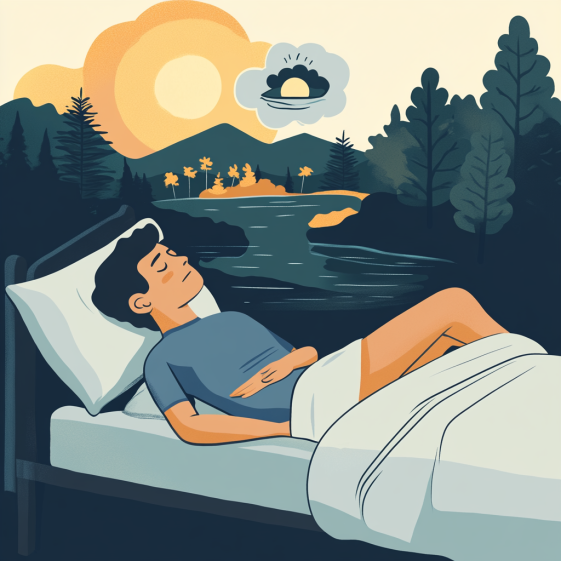Deep Sleep Optimization: 7 Proven Hacks for Restful Nights
Deep Sleep Optimization is the secret to waking up energized, sharpening your mind, and supporting your long-term well-being.
If you often struggle to stay asleep, feel unrested, or wake up groggy, you’re missing out on the true power of deep sleep.
This guide covers 10 proven hacks to help you fall asleep faster,
sleep deeper, and wake up feeling genuinely refreshed—starting tonight.
Key Takeaways
- Deep Sleep Optimization boosts morning energy, mental focus, and long-term health.
- Consistent routines, a healthy sleep environment, and the right diet are essential.
- Small changes—like reducing blue light and eating sleep-promoting foods—make a big impact.
- Improving deep sleep supports immunity, weight management, and emotional health.
- Everyone can benefit from these expert-backed sleep hacks—no fancy gadgets required.
1. Deep Sleep Optimization Starts with a Consistent Sleep Schedule
Your body’s circadian rhythm thrives on routine, making a steady sleep schedule the #1 foundation for Deep Sleep Optimization.
Irregular sleep patterns confuse your internal clock, making it much harder to achieve deep sleep consistently.
Science shows that people who go to bed and wake up at the same time each day experience better sleep quality and improved energy.

How to Fix Your Sleep Schedule for Deep Sleep Optimization:
- Go to bed and wake up at the same time every day—even on weekends.
- Avoid long naps, which can disrupt your natural rhythm.
- Get sunlight exposure each morning to reset your circadian rhythm.
- Wind down with a relaxing nighttime routine for easier deep sleep.
Learn more about healthy sleep routines in our guide to fixing your sleep schedule naturally.
For more tips, visit Sleep Foundation’s healthy sleep hygiene tips.
2. Deep Sleep Optimization and Sleep Hygiene: Creating a Sleep Sanctuary
Your bedroom environment directly impacts your sleep depth and quality.
Deep Sleep Optimization means transforming your room into a true sleep sanctuary.
A dark, cool, quiet, and tech-free bedroom helps your mind and body shift into deeper, more restorative sleep cycles.

How to Optimize Your Sleep Environment:
- Keep your bedroom temperature between 60–67°F (15–19°C).
- Use blackout curtains to block light and help signal bedtime.
- Invest in a quality mattress and pillow for proper support.
- Remove electronics to cut blue light exposure before bed.
Explore more in Deep Sleep Hacks for a Better Sleep Environment.
3. Deep Sleep Optimization with the Right Diet
Your evening nutrition plays a major role in Deep Sleep Optimization.
What you eat can affect melatonin production, blood sugar stability, and gut health—all crucial for restorative sleep.
Eating the right foods in the evening helps your body transition smoothly into deeper sleep stages.

Best Foods for Deep Sleep Optimization:
- Bananas: High in magnesium and potassium, which relax muscles.
- Almonds & walnuts: Provide melatonin and healthy fats for steady blood sugar.
- Tart cherries: A natural source of melatonin to promote sleep.
Learn more in How Gut Health Affects Deep Sleep & Overall Well-Being.
For additional science, see Sleep Foundation’s food and sleep guide.
4. Deep Sleep Optimization and Your Immune System
Deep Sleep Optimization is vital for keeping your immune system strong.
Poor sleep weakens your defenses, making you more susceptible to illness.
Prioritizing deep, uninterrupted sleep improves your body’s ability to fight off infections and recover faster.

How to Strengthen Immunity Through Deep Sleep Optimization:
- Sleep at least 7–9 hours per night.
- Reduce chronic stress with calming bedtime rituals.
- Stick to a consistent deep sleep routine—even on weekends.
See our article The Link Between Deep Sleep and Immune Health for practical steps.
For more, check out NIH research on sleep and immunity.
5. Deep Sleep Optimization and Weight Loss
Did you know Deep Sleep Optimization helps regulate metabolism and support healthy weight loss?
Deep sleep influences hunger hormones, balances cortisol, and boosts fat metabolism, making it a silent partner in your weight loss journey.
How Deep Sleep Optimization Helps with Weight Loss:
- Regulates hunger hormones (leptin & ghrelin) for better appetite control.
- Lowers stress-related cortisol, reducing stubborn belly fat.
- Improves fat metabolism and aids muscle recovery overnight.
Learn more in The Connection Between Deep Sleep and Weight Loss.
6. Deep Sleep Optimization and Emotional Processing
Your brain processes emotions, memories, and daily stress during deep sleep.
That’s why Deep Sleep Optimization leads to improved emotional regulation, resilience, and mental clarity.
Lack of deep sleep is strongly linked to anxiety, mood swings, and brain fog.
How to Improve Emotional Regulation with Deep Sleep Optimization:
- Stick to consistent sleep patterns—even if your schedule changes.
- Practice relaxation techniques, like meditation or gentle stretching, before bed.
- Reduce screen time in the hour before sleep to prevent stress triggers.
Read more in How Deep Sleep Affects Emotional Health.
7. Deep Sleep Optimization and Dream Science
Dreams play a crucial role in cognitive health, and REM sleep is vital for memory retention.
Deep Sleep Optimization not only improves dream quality but also helps you wake up feeling clear-minded and emotionally balanced.
Better REM cycles mean sharper memory and faster learning.
How Deep Sleep Optimization Improves Dream Quality:
- Prioritize healthy sleep habits to get enough REM sleep.
- Avoid alcohol and late-night caffeine, which disrupt REM cycles.
- Keep a dream journal to track patterns and boost self-awareness.
Discover more in The Science of Dreams & Their Link to Deep Sleep.
Explore research at WebMD’s REM sleep guide.
Final Thoughts: Unlock the Power of Deep Sleep Optimization
Deep Sleep Optimization unlocks better energy, sharper focus, and lifelong health benefits.
By fixing your sleep schedule, optimizing your bedroom, eating sleep-friendly foods, and managing stress,
you’ll maximize your deep sleep and transform your nights—starting tonight.
🌙 Try these proven hacks for Deep Sleep Optimization and see just how amazing you can feel. For more resources, check out:
- How Pro Athletes Maximize Deep Sleep for Recovery & Performance
- Essential Healthy Sleep Tips from Sleep Foundation
- The Science Behind Deep Sleep & Gut Health
FAQ
What is Deep Sleep Optimization?
Deep Sleep Optimization is a set of science-backed strategies to improve the quality, depth, and restorative power of your sleep, so you wake up feeling refreshed, focused, and energized.
How can I increase deep sleep naturally?
To increase deep sleep naturally, maintain a consistent sleep schedule, keep your bedroom cool and dark, eat sleep-friendly foods, manage stress, and limit blue light exposure at night.
Does Deep Sleep Optimization help with mental health?
Yes, optimizing deep sleep improves mood, reduces anxiety, supports emotional regulation, and protects against long-term cognitive decline.
Can Deep Sleep Optimization boost my immune system?
Absolutely! Deep, restorative sleep is essential for a resilient immune system and faster recovery from illness.
Is Deep Sleep Optimization good for weight loss?
Yes—by regulating appetite hormones and metabolism, deep sleep makes weight management easier and more sustainable.
Discover more tips in our guide to sleep myths and facts, how to fall asleep fast, and bedroom setups for deeper sleep.
Related reading from Cozy Bed Quarters
- Deep Sleep Myths vs. Facts: What You Need to Know
- How to Reset Your Sleep Schedule Naturally
- Best Bedroom Setups for Deeper Sleep
Other reading we found popular
- Eachnight: Deep Sleep Explained
- The Spruce: How to Create a Sleep-Friendly Bedroom
- Architectural Digest: Bedroom Design for Better Sleep
- Apartment Therapy: Bedroom Sleep Tips




